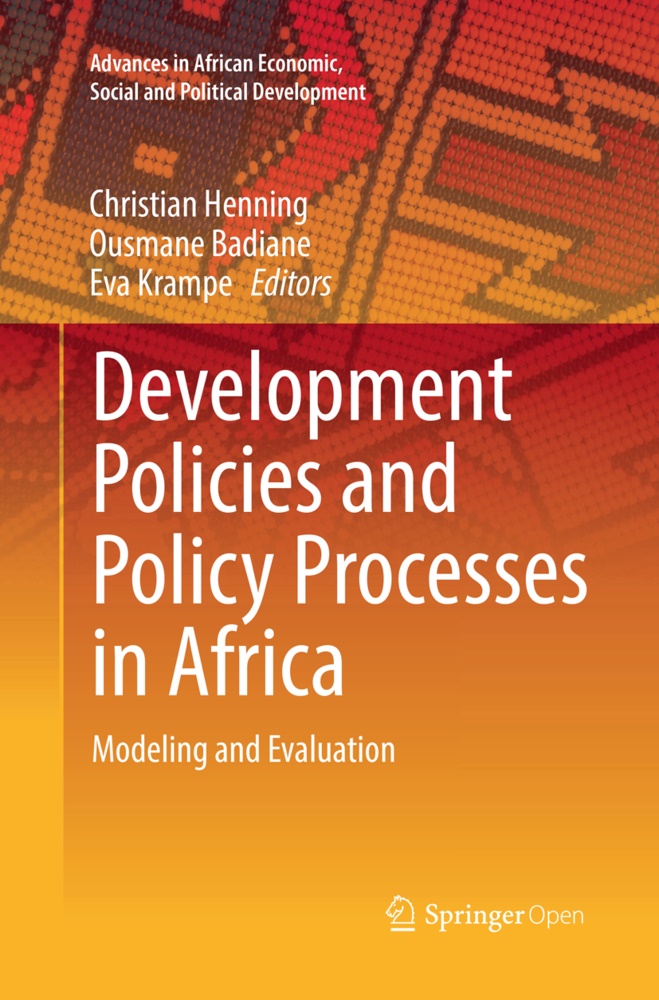Mehr lesen
This book is open access under a CC BY 4.0 license.
The book examines the methodological challenges in analyzing the effectiveness of development policies. It presents a selection of tools and methodologies that can help tackle the complexities of which policies work best and why, and how they can be implemented effectively given the political and economic framework conditions of a country. The contributions in this book offer a continuation of the ongoing evidence-based debate on the role of agriculture and participatory policy processes in reducing poverty. They develop and apply quantitative political economy approaches by integrating quantitative models of political decision-making into existing economic modeling tools, allowing a more comprehensive growth-poverty analysis. The book addresses not only scholars who use quantitative policy modeling and evaluation techniques in their empirical or theoretical research, but also technical experts, including policy makers and analysts from stakeholder organizations, involved in formulating and implementing policies to reduce poverty and to increase economic and social well-being in African countries.
Inhaltsverzeichnis
Introduction.- Part I: Modeling Economic Policies.- Macro-Economic Models.- Micro-Economic and Micro-Macro Linked Models.- Part II: Modeling Policy Processes.- Concluding Remarks.
Über den Autor / die Autorin
Christian Henning is professor and chair of agricultural economics, University of Kiel (Germany). He studied economics, agricultural economics, sociology, political science and mathematics. He earned a PhD in economics, in agricultural economics and in political science. His main areas of specialization are applied political economy and applied economic modelling of agricultural policies. To date he has published 5 books and various articles in refereed journals including PLoS ONE, American Journal of Agricultural Economics, European Review of Agricultural Economics, Journal of Public Policy, Journal of Mathematical Sociology and Journal of Theoretical Politics. Currently he is working on the IFPRI-project “Promoting participatory and evidence based policy processes in Africa”. Ousmane Badiane is the Director for Africa at the International Food Policy Research Institute (IFPRI), based in Washington, D.C. He oversees the Institute’s regional offices for West and Centra
l Africa in Dakar, Senegal, and for Eastern and Southern Africa in Addis Ababa, Ethiopia. He received a Master’s Degree and PhD in agricultural economics from the University of Kiel in Germany. His awards include being selected as a 2015 Yara Prize Laureate, a Doctoral Degree Honoris Causa from the University of KwaZulu Natal in South Africa and induction as Distinguished Fellow of the African Association of Agricultural Economics.
Eva Krampe is an agricultural sector expert at the European Investment Bank. She studied agricultural economics and earned a PhD in agricultural economics at the University of Kiel. Her main areas of specialization are Africa’s Agricultural Policy, Applied Political Economy and Economic Analysis of Agricultural Investment Projects.
Zusammenfassung
This book is open access under a CC BY 4.0 license.
The book examines the methodological challenges in analyzing the effectiveness of development policies. It presents a selection of tools and methodologies that can help tackle the complexities of which policies work best and why, and how they can be implemented effectively given the political and economic framework conditions of a country. The contributions in this book offer a continuation of the ongoing evidence-based debate on the role of agriculture and participatory policy processes in reducing poverty. They develop and apply quantitative political economy approaches by integrating quantitative models of political decision-making into existing economic modeling tools, allowing a more comprehensive growth-poverty analysis. The book addresses not only scholars who use quantitative policy modeling and evaluation techniques in their empirical or theoretical research, but also technical experts,
including policy makers and analysts from stakeholder organizations, involved in formulating and implementing policies to reduce poverty and to increase economic and social well-being in African countries.

